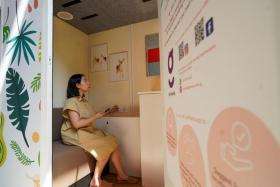More mums breastfeeding exclusively while in hospital
Number of newborns being breastfed grows, but that figure plunges after six months
New mother Linda Wee breastfeeds her month-old daughter. It is how she avoids having to pay for infant formula, which she thinks is exorbitantly priced.
Over the last decade, milk prices have surged by 120 per cent on average.
The issue, which surfaced in Parliament on Monday, was threw up an intense debate.
Mrs Wee, 32, told The New Paper: "Savings aside, there are so many other advantages to breastfeeding. It may be difficult sometimes, but nothing in parenthood comes easy."
The number of mothers who exclusively breastfeed while still warded in hospital is on the rise, maternity hospitals tell TNP.
KK Women's and Children's Hospital (KKH) saw 85 per cent of their mothers exclusively breastfeeding last year, up from 75 per cent in 2013, said its neonatology head and senior consultant Chua Mei Chien.
Singapore General Hospital (SGH), too, has seen an upward trend, with about 60 to 65 per cent of the babies exclusively breastfed, said its obstetrics and gynaecology senior consultant Yong Tze Tein.
Similarly, National University Hospital (NUH) saw the proportion of newborns being exclusively breastfed increase from 50 per cent to 80 per cent after 2010, said its neonatology senior consultant Yvonne Ng Peng Mei.
This is due to the Baby-Friendly Hospital Initiatve (BFHI) practices implemented in NUH. They include helping mothers initiate breastfeeding within 30 minutes of giving birth and encouraging breastfeeding on demand.
Dr Ng told TNP: "In a baby-friendly hospital environment, breastfeeding is the 'norm'.
"Mothers are empowered with knowledge and skills to breastfeed and provided support if they encounter difficulties with breastfeeding."
Of the five maternity hospitals selected for BFHI accreditation, KKH, NUH and SGH have met their targets.
In recent years, support groups here have been advocating a more conducive environment for breastfeeding.
Very persuasive advertisements from infant formula make mothers think formula milk is good enough or even better, but it is not true.SGH obstetrics and gynaecology senior consultant Yong Tze Tein
But when it comes to breastfeeding after the mother is discharged from hospital - figures that most health institutions here do not track - the picture appears less rosy.
National Healthcare Group Polyclinics is reviewing 200 babies to find out their feeding practices when they are a month old and four months old.
The first part of the review as of now shows that, at the baby's first month, 36 per cent of them were exclusively breastfed.
The Health Promotion Board's (HPB) latest National Breastfeeding Survey, in 2011, found that less than 1 per cent of mothers were still breastfeeding exclusively at six months.
This is low, compared to the 34 per cent of mothers in the United Kingdom and 49 per cent in the US, according to a Lancet study last year.
DESIRED TARGET
"This percentage (in Singapore) is still far from the desired target of 30 per cent," said SGH's Associate Professor Yong.
Other than the inability to produce sufficient milk, mothers may be afraid to breastfeed because they are afraid they do not have enough milk supply, said Prof Yong, who is also the president of the Association for Breastfeeding Advocacy (Singapore).
Education levels make a difference too, the survey found.
More among university-educated mothers breastfed, compared to that of primary school-educated mothers.
National University of Singapore's sociologist Tan Ern Ser explained: "Higher-educated mothers have learned and are convinced about the nutritional value of breast milk for their babies' development as well as the bonding effect of holding the baby while breastfeeding."
Referring to milk powder, Prof Yong said: "Very persuasive advertisements from infant formula make mothers think formula milk is good enough or even better, but it is not true."
She said some mothers could be misinformed on what breastfeeding involves.
"For example, breast milk is easily digested, hence a baby needs to feed often to stimulate supply. Mothers often misinterpret that this means their milk must be of poor quality, since their babies get hungry so easily," Prof Yong said.
The HPB survey also showed that the prevalence of any breastfeeding from one month after childbirth was also lower among working mothers compared to homemakers.
A lack of nursing facilities at work hinders breastfeeding, and it is one of several factors that deter the practice, said NUS' Associate Professor Tan.
"Difficulties in balancing the demand of breastfeeding and work could be another deterrence, which working from home and flexible work arrangement may not adequately address," he said.
Get The New Paper on your phone with the free TNP app. Download from the Apple App Store or Google Play Store now



